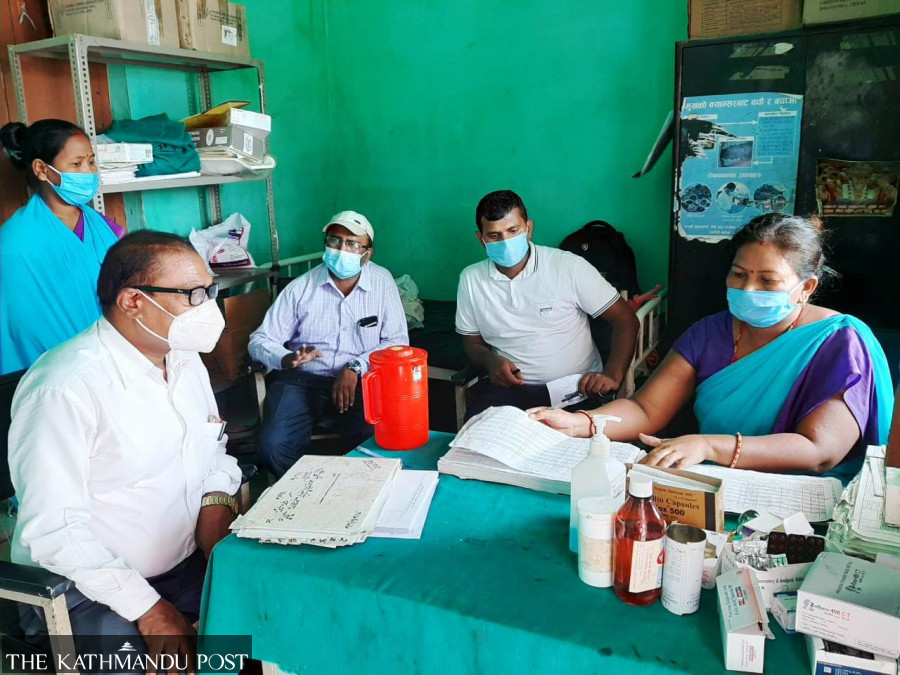Health
Staff adjustment leads to personnel mismanagement at health facilities
Many health workers in overstaffed local units deprived of salaries for months.
Arjun Poudel
For the last three months, Manoj Ojha, a public health inspector at ward 11 of Dhangadhi Sub-metropolitan City has not received his salary.
Officials at the Municipality said that they are not in position to pay the salary to health workers including Ojha, as the City currently has more than double health workers than the sanctioned posts.
Many local units across the country faced an overstaffing issue after the federal government introduced a civil servants adjustment scheme in 2018 and transferred federal civil servants to work under provincial and local governments, which were reeling under staff shortage. Among other things, civil servants were given the option to work at the provincial and local government offices nearest to their residences while husbands and wives were allowed to choose workstations best suited to them.
“We have been deprived of our salaries for months,” Ojha told the Post over the phone from Dhangadhi. “Other health workers might have their own problems, but I am in big trouble. I am even unable to pay the children's school fees and installment of the bank loan.”
Ojha and other 33 health workers serving in the sub-metropolitan city have been deprived of their salaries for the last three months. But City officials said they don’t have resources to pay the salaries.
“Our local unit [sub-metropolitan city] has only 15 sanctioned posts for health workers but currently we have 34 health workers,” said Nripa Bahadur Od, the mayor of Dhangadhi. “We cannot pay the salaries from the sub-metropolitan city’s resources, and the federal Ministry of Health and Population, which is responsible for paying them, has stopped sending us funds to pay the additional health workers.”
This was a common refrain of many local units in accessible areas, which have been overstaffed after the adjustment of the civil servants some two years ago.
However, people in remote villages have been deprived of the basic health care services, due to lack of health workers.
“Of the five health facilities under our jurisdiction, none has full human resources,” Mukesh Kunwar, a health worker serving at Vyas Rural Municipality, told the Post over the phone from Darchula.
According to Kunwar, only three health workers have been serving at Dhaulikot health post, two each in Ratla health post, Vyas health post and Huti health post; and four in Sunsera health post. All the health posts have five sanctioned posts of health workers.
Vyas Rural Municipality is one of the remotest areas that lies in the north-western corner of the country.
In March 2019,the government had announced the completion of the civil servants adjustment process in all three tiers of the government—federal, provincial and local.
But the adjustment could not address the problem of manpower crunch in the health facilities in remote areas depriving the residents of basic health care services.
The residents of Vyas Rural Municipality, which borders Kalapani and Tibet have to go to India or come to Dhangadhi and Nepaljung for consultant care.
The Ministry of Health and Population recently decided to send funds to local governments just enough to pay those working under the sanctioned staff quota. And this decision has left many unpaid health workers worried.
“The decision was taken to discourage overstaffing at health facilities in accessible areas,” Dr Samir Kumar Adhikari, joint spokesperson for the Health Ministry, said. “Health facilities in remote areas are reeling under a health workers shortage while those in accessible areas including cities and towns have health workers up to three times the sanctioned quota.”
Multiple health workers including doctors, the Post talked to, said that the government’s earlier decision to allow health workers to choose their work stations was the root cause of the problems including the high concentration of health workers in urban areas and shortages in rural areas.
“Who would want to work in remote places when they are allowed to choose between remote and urban areas,” Dr Guna Raj Awasthi, former provincial health director of Sudurpaschim Province, said.
Experts say surplus health workers in the accessible areas do not mean that local levels do not need service of those health workers. Many local levels that need more health workers than the sanctioned quota have recruited health workers on their own and are paying salaries from their own resources. But after many civil servants including health workers were adjusted in local governments under the government’s staff adjustment scheme, many local governments felt the federal government foisted unnecessary manpower on them.
“Local governments can hire staffers of their choice and they don’t have problems paying the salaries to the health workers they hired themselves,” said Ojha from Dhangadhi Sub-metropolis.
Health workers complained that the federal government’s decision to authorise the chiefs of local governments to transfer staffers worsened the problems of overstaffing and understaffing at the local units.
“The haphazard transfers have not only affected the health workers but incurred huge damage to the health care sector,”said Awasthi.




 9.89°C Kathmandu
9.89°C Kathmandu















